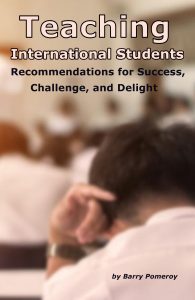By the point of the final exam, there is little we can do as instructors. Our responsibility is to hand the students on to the next year as prepared as we can make  them in the time allotted. We have designed a course we thought best supplied the information the students need to succeed in our class as well as advance in their university career. We have chosen texts and a teaching style which are not overly culturally bound so that all students have an equal chance of understanding the texts as well as us, conducted workshops which help them learn to avoid common student errors in writing as well as academic misconduct, and we have ensured that the skills required for each assignment were taught in advance and graded accordingly.
them in the time allotted. We have designed a course we thought best supplied the information the students need to succeed in our class as well as advance in their university career. We have chosen texts and a teaching style which are not overly culturally bound so that all students have an equal chance of understanding the texts as well as us, conducted workshops which help them learn to avoid common student errors in writing as well as academic misconduct, and we have ensured that the skills required for each assignment were taught in advance and graded accordingly.
Teaching is a thankless task in some ways, for our students rarely appreciate what we do while they are being taught. They never see the thought put into the course schedule, selection of texts, and assignments, and while they are engaged in the gruelling slog which is learning they may not realize the importance of the class material. That is a natural procedure, for the course should be transparent in terms of the information delivered. The attendee of a concert is not interested in how the music was written, the tuning up or the purchasing of strings, but rather has bought the ticket to see the final result.
We do not teach in order to receive gratitude, but because we owe a debt to the instructors who suffered our own petty meltdowns, our attempts to cheat on assignments, and our carelessly crafted essays. Like a child seldom realizes what they owe to their parent until they are gone, with the term’s end our students will disappear from our sight. During chance hallway meetings they may say that they have used the skills we taught, but they will likely never realize the work we put into the course.
What we have taught them will become part of their cultural legacy, however, and they will carry that forward into their own career. We have to be satisfied with that.
